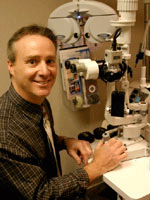Here is an article about transitioning from student to practitioner and to offer my advice for optometry students. – Dr. Kestenbaum

First, let me tell you a little bit about myself. After falling inlove with Boston on a brisk March day in 1976, the day of my interview at the New England College Of Optometry (at that time it was called NEWENCO), I knew that this was the place for me to spend my next four years. NEWENCO offered the professional education, the ambiance of a Boston brownstone, overlooked the Charles River and was very convenient to all that Boston had to offer.
We started our clinical rotations in our second year at the school’s clinic then located in Kenmore Square. Many of the yesterday’s preceptors are now today’s administrators at many schools of optometry.
Many of my classmates are not only clinicians but they are educators, writers, lecturers, heads of huge clinics, and well respected in the field.
As for me, I chose private practice after trying the various avenues that are available to graduating students. I couldn’t stand corporate optometry controlling the way I practice or the chain store opticians having me see a patient every 10 minutes just to sell a pair of eyeglasses to them. I needed to control my own destiny and practice the way I wanted to practice….professionally.
Starting cold in 1984 wasn’t easy. It took a good two years before I started earning a living wage but the wait was well worth it. Using all that I learned in professional school along with what I learned in my four years after graduating about the business side of optometry, patients actually started flocking through the door. My appointment book started to fill up and I actually needed to hire more employees, some of whom are still with me today.
My favorite thing about being an optometrist is working with people.
The hardest thing about being an optometrist is working with people.
As an eyecare professional, you will not only examine eyes, but you will be your patient’s sounding board. They will tell you all about their lives from their children to their parents, from their marriage to their divorce. As a clinician you will be obliged and most times interested to listen intently while providing a comprehensive eye health examination and impeccably recording your findings in the electronic medical record in a timely manor so as not to get too backed up in your appointment schedule.
One of the things I would have done differently is to take more business courses. They just don’t teach how to run a business in optometry school. On the job training is how I learned but it would have been much easier had I had a little training. The other is I should have bought my own space. Currently I pay rent so I am beholding to a landlord who may or may not renew a lease. What is a business worth with no lease? My recommendation for those considering owning their own practice is to buy your space if possible. It virtually guarantees your practice will thrive assuming you know how to run it.
My advice to students transitioning to practicing optometrists is to explore all your options. If you want to practice corporate, try it for a while so you can make an informed decision. If you want a private practice, seek out an optometrist who is considering retirement or cutting back in the next 10 years and become an associate. Put in your dues and your hard work will be worth it in the end. For the women in optometry who might want to balance raising a family with owning a practice, consider partnership with others doing the same thing.

In the past few years I have become a mentor to a few students. It was new to me and I’ve come to enjoy it very much. It started with Matthew Geller, now a student at SUNY College of Optometry. Matt is starting his second year and actually applied to optometry school after speaking with me and working in my office. Another is an extremely intelligent student Teresa Concha who is starting SUNY as a freshman. My last intern, an interesting girl who will be a senior at the University of Waterloo, will be applying to optometry school this year. In my practice, the students are exposed to clinical care in our virtually paperless office and to the business side of optometry. From various front desk duties to observing and often assisting in patient pre-testing, shadowing in the exam room and following the patient to the dispensary, assisting patients in choosing eyewear and lending a hand in the lab, calling patients to notify that the eyewear is completed and observe the dispensing. They observe me or my staff in the business office, while we notify or discuss issues with patients, delegate responsibilities to other valuable employees, ordering contact lenses, interpreting visual fields, GDX or Retinal Photos, and get a sense of what it really takes to run a successful optometric practice.
Students will leave with a good sense of the details that go into running a successful business. Did I say business? Yes, optometry is also a business. I love to help people and yes I like to make money…. You will too.
For those students that may have an interest in interning with me, please go to my website for our telephone number and give me a call. I look forward to it.
Joel Kestenbaum, OD
www.optixeyecare.com

